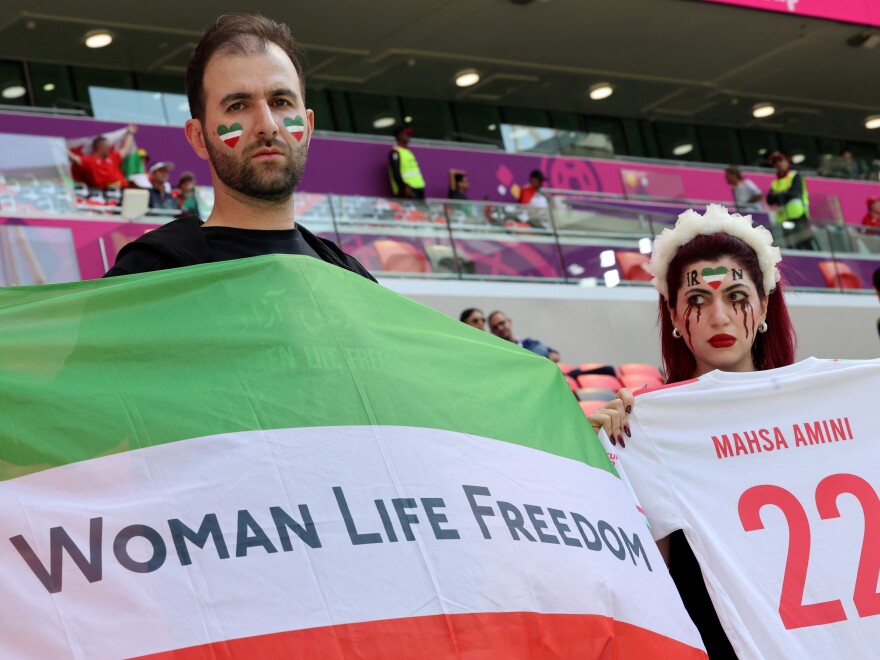Qatar warned about clothing restrictions for this year's World Cup, and fans are finding out that officials weren't bluffing about cracking down.
FIFA's Stadium Code of Conduct for this year's event, put into effect in July, prohibits fans from bringing in tools or weapons, as well as flags or other materials that are deemed political or discriminatory. It also advises that any helmet or mask that covers the face, besides a medical mask and/or national and religious headwear, is not permitted.
Additionally, it bans being in a "state of undress" and the removal of clothing to reveal "intimate body parts." The specifics of those definitions are somewhat vague. In a country such as Qatar, where dressing conservatively is encouraged, it could mean something more modest than what other cultures are accustomed to.
But at least a few times, controversial outfits have slipped into stadiums. Here are a few instances where clothing choice has caused a commotion at the World Cup.
Iran protests
Iranian fans have used clothing — both holding and wearing it — to protest the death of Mahsa Amini. The young woman died in custody of Iran's morality police, who arrested her for wearing what they considered inappropriate clothing.
A fan wearing a shirt that read "Woman, Life, Freedom" at the Iran vs. Wales match last Tuesday was made to change before she could continue to watch the game, because the words are a Kurdish slogan for women's rights protesters.
A protester held up an Iran soccer jersey with Mahsa Amini's name and her age, 22, printed on it before the same match. The demonstrator wore makeup to resemble blood trickling from her eyes. Next to her, another protester displayed an Iranian flag with "Woman Life Freedom" written on its middle white stripe. They were both approached by security, who appeared to take the shirt and flag.
Rainbow apparel

Security confiscated some female Wales fans' rainbow bucket hats, which symbolized their support for LGBTQ rights. The Rainbow Wall, the group behind the hats, wrote that only the women were asked to take the hats off.
Our rainbow bucket hat. We are so proud of them, BUT news on the ground tonight is our welsh female supporters wearing them in #Qatar are having them taken off them, Not the men, just Women. @FIFAcom ARE YOU SERIOUS !!#LGBTQRights 🏴🏳️🌈🏳️⚧️#WeBelong | #NoPrideWithoutAll pic.twitter.com/bvo9y51WzG
— The Rainbow Wall 🏳️🌈🏳️⚧️🏴 (@TheRainbowWall) November 21, 2022
U.S. journalist Grant Wahl said he was detained for 25 minutes for refusing to change out of his rainbow shirt.
In his Substack column, he wrote that a security commander later approached him to apologize and say they would let him through.
"One of the security guards told me they were just trying to protect me from fans inside who could harm me for wearing the shirt," he wrote in the column. "The entire episode left me wondering: What's it like for ordinary Qataris who might wear a rainbow shirt when the world isn't watching here?"
I’m OK, but that was an unnecessary ordeal. Am in the media center, still wearing my shirt. Was detained for nearly half an hour. Go gays 🌈 https://t.co/S3INBoCz89
— Subscribe to GrantWahl.com (@GrantWahl) November 21, 2022
Knights Templar costumes

To other football matches, English fans have dressed up in faux chain mail, swords and shields. FIFA has reportedly told attendees to not wear those costumes, which could appear to be inspired by the Knights Templar.
The knights played a large part in the Crusades in the 12th and 13th centuries, when Christian Western Europeans fought to seize holy sites from Muslim control.
"Crusader costumes in the Arab context can be offensive against Muslims. That is why anti-discrimination colleagues asked fans to wear things inside out or change dress," a FIFA official said, according to The Times.
Two England fans dressed as knights reportedly were stopped and made to strip naked before they could watch what was left of the game.
Photos from England's match with Iran show that people with the outfits were in the stadium.
Copyright 2022 NPR. To see more, visit https://www.npr.org.


